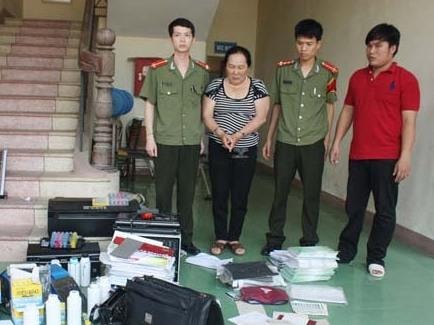Cracking down on a sophisticated case of counterfeiting seals and documents in Nghe An
(Baonghean) - Recently, in Nghe An, there have been a number of cases of counterfeiting seals and documents of agencies and organizations; this situation is still a prominent issue, causing public outrage.
Follow the lead of fake documents
Referring to Nguyen Thi Huong (residing in Tan Hoa block, Ha Huy Tap ward, Vinh city), Major Nguyen Thanh Nhan - Deputy Head of Nghi Loc district police could not forget the case of counterfeiting seals and documents in November 2016. Previously, according to information provided by PC64, Nguyen Trung Anh (born in 1987), residing in Le Loi ward, Vinh city, used a fake ID card.
 |
| Nguyen Thi Huong and the evidence of many fake seals and documents were arrested by the police. Photo: NH |
The authorities determined that this case of forging documents of organizations and state agencies involved many subjects, seriously affecting social order and safety, so they established a special project to fight. On November 27, 2016, the police arrested Phung Ba Toan, residing in Nghi Xuan commune (Nghi Loc), while he was carrying 1 ID card and 1 diploma, both of which were fake, to give to customers.
From Toan's testimony, the police consecutively arrested Nguyen Cong Ung, residing in Phuc Tho commune, Nghi Loc district; Duong Xuan Huyen, residing in Ngu Loc hamlet, Hung Loc commune (Vinh city).
Based on the statements of Ung and Huyen, Nghi Loc district police arrested Nguyen Thi Huong (born in 1954), residing in Tan Hoa block, Ha Huy Tap ward, Vinh city. Huong was identified as the person who produced the above fake files and documents and then sold them to other interested parties. During the search, the police seized 2 un-pressed fake ID cards; 3 color printers, 1 color scanner, and 1 computer from Huong's house.
According to Major Nhan, in April 2016, Huong was arrested by the Nghe An Provincial Police Security Investigation Agency when she and her accomplices forged documents of agencies and organizations.
Searching Nguyen Thi Huong's residence, the police seized many fake diplomas and fake seals, such as the seal of Nghi Loc 4 High School (Nghi Loc district), Hung Loc Commune People's Committee (Vinh city), Nghe An Department of Education and Training, even a fake seal of an army regiment, certified copies, signatures of leaders, various types of blanks and hundreds of other documents related to the forgery of documents and seals of agencies and organizations.
On June 21, 2017, the Provincial People's Court tried the case of "Fraudulent appropriation of property" and "Forgery of seals and documents of agencies and organizations" against Dang Hong Anh (residing in Tan Thanh commune, Yen Thanh district). According to the records, Dang Hong Anh, Nguyen Duy Dong, Dinh Minh Duc (all residing in Yen Thanh district) and Pham The Anh (residing in Dien Chau district) rented a self-driving car and then sold or pawned it.
The modus operandi of the subjects was to rent cars from self-drive car rental services and then ask Pham The Anh, a printer of advertisements, to fake the car registration. From March 2015 to March 2016, the subjects rented 18 cars and then forged the documents, sold them to appropriate more than 7.2 billion VND.
Recently, in Nghe An, there have been a number of cases of counterfeiting seals and documents of agencies and organizations. Although the above crimes have been arrested and strictly handled before the law, counterfeiting of seals and documents is still a prominent issue, causing public outrage.
It is worth mentioning that with extremely sophisticated technology, the current crime of forging seals and documents of agencies and organizations not only "targets" identity cards, car and motorbike registrations, but also important documents related to economic and social sectors such as diplomas, university certificates, land use right certificates...
Sophisticated and discreet tricks
According to the leader of the Criminal Techniques Department of Nghe An Police, through the appraisal work, it shows that the methods and tricks of producing fake papers and documents of agencies and organizations are increasingly sophisticated. From motorbike and car registrations, ID cards to university degrees, decisions of competent agencies are all forged.
In the past, many types of fake documents were “produced” by hand screen printing, but today they are “made” on computers with modern software. Some fake documents are “made” from real blanks, then erased and edited. The sophistication of fake documents is such that even people who regularly deal with such documents are fooled.
 |
| The Provincial Police's Criminal Techniques Department uses technical means to identify the seal. Photo: NH |
Regarding seals, in the past, the stamps were produced by criminals who made fake documents by scanning and copying real stamps and then printing them in digital color. Fake signatures were also created using digital color printing or a fake signature set. The forgery was easily detected by the naked eye because the signature imprint could not be created on the print and the ink was not the same color as the stamp.
To cope, the entire stamp and signature are created by the subjects from fake stamps through laser engraving method. The stamps made by this method when used to stamp directly on documents are very sharp, difficult to distinguish with the naked eye because the ink is even and the same color. The font and size on the stamp are edited by digital drawing software on the computer for high accuracy, similar to the real stamp, making detection more and more difficult.
When notarized documents have the same legal value as the original, it is very difficult to detect fake documents. In particular, many wanted subjects have forged documents and faked names to avoid the authorities.
For the police, the verification of fake documents is also supported by technical means. But for people, organizations and units, it is only visible with the naked eye, so it is very difficult to detect.
Fake seals and documents not only affect the operations of agencies and organizations but also affect the rights and lives of people.
To contribute to preventing and effectively combating this type of crime, in addition to the drastic participation of functional forces in inspection and management work, people need to raise awareness, not buy, sell, or use fake documents and degrees, and avoid assisting criminals.
Article 267 of the 1999 Penal Code, amended and supplemented in 2009, stipulates the crime of forging seals and documents of agencies and organizations as follows: 1. Anyone who forges a seal, document or other paper of an agency or organization or uses such seal, document or paper to deceive an agency, organization or citizen shall be subject to a fine of between five million and fifty million Dong or imprisonment of between six months and three years. 2. Committing a crime in one of the following cases shall be punishable by imprisonment from two to five years: a) Organized; b) Committing the crime multiple times c) Causing serious consequences; d) Dangerous recidivism. 3. Committing a crime causing very serious or especially serious consequences shall be punishable by imprisonment from four to seven years. 4. Offenders may also be fined from five million to fifty million Dong. |
Nguyen Hung
| RELATED NEWS |
|---|

